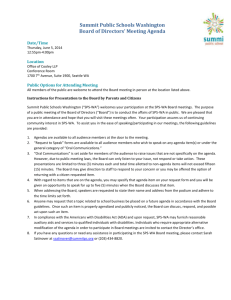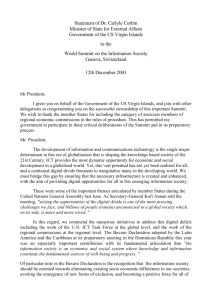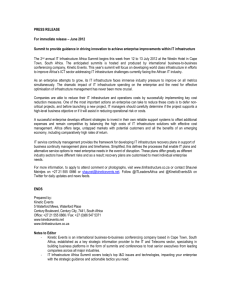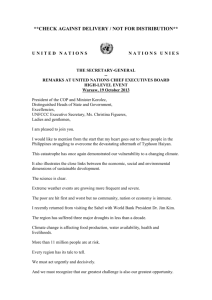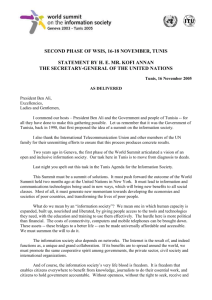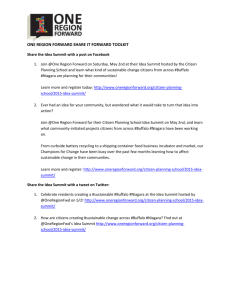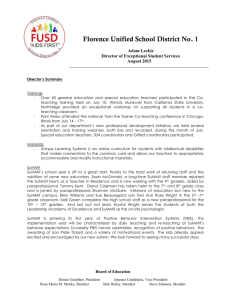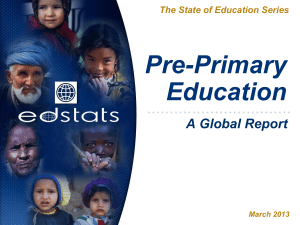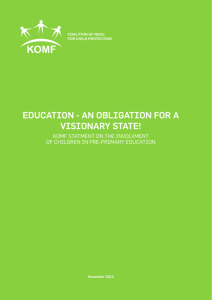14 Dec - Ministry of Education and Human Resources, Tertiary
advertisement
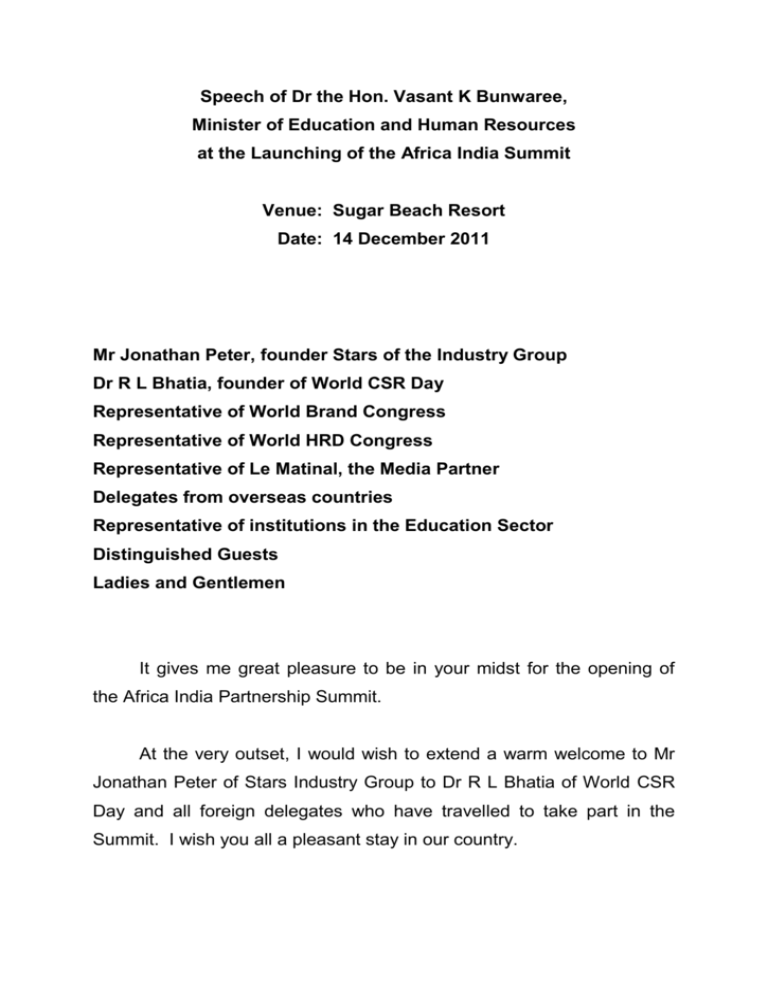
Speech of Dr the Hon. Vasant K Bunwaree, Minister of Education and Human Resources at the Launching of the Africa India Summit Venue: Sugar Beach Resort Date: 14 December 2011 Mr Jonathan Peter, founder Stars of the Industry Group Dr R L Bhatia, founder of World CSR Day Representative of World Brand Congress Representative of World HRD Congress Representative of Le Matinal, the Media Partner Delegates from overseas countries Representative of institutions in the Education Sector Distinguished Guests Ladies and Gentlemen It gives me great pleasure to be in your midst for the opening of the Africa India Partnership Summit. At the very outset, I would wish to extend a warm welcome to Mr Jonathan Peter of Stars Industry Group to Dr R L Bhatia of World CSR Day and all foreign delegates who have travelled to take part in the Summit. I wish you all a pleasant stay in our country. 2 I am particularly delighted that our country has been chosen as the venue for this Summit. The Summit will be represented by participants from around 60 countries of Africa and India. It is marked by the presence of prominent leaders and decision makers. It is beyond doubt a high profile forum to reflect on the reinforcement of India-Africa cooperation. India, as one of the emerging economies, has made considerable progress in important areas, such as, telecommunications, the pharmaceutical industry, manufacturing, oil and gas production, mining, banking and insurance portfolios, travel and tourism, business process outsourcing (BPO), Information and Communication Technology, Agriculture, Bio-technology and the services sector. Africa is perceived as the upcoming frontier of development. The fact that Mauritius has been chosen as the venue of the Summit sends the right signal that our country may serve as a gateway to promote India Africa partnership. In the wake of the financial turmoil upsetting the world economy and the economic crisis affecting several countries of the Euro Zone, it has been necessary to adopt measures for the restructuration of our economy. The economic base has been broadened in order to rely on new emerging sectors. At the same time, steps have been taken for the democratization of the economy to ensure wider participation towards economic development. 3 For a small country like Mauritius, there was no alternative than to embark on a reform of the Education sector to meet the challenges of development. Creative learning, which is the acquisition of skills that unlock human potential, becomes a paramount necessity since education and human resource development are the drivers of economic growth. Through consultation and consensus building with stakeholders, I would like to bring out that a comprehensive Education and Human Resource Strategy Plan was elaborated. The Education and Human Resource Strategy covers the main sectors ranging from Pre-primary, Primary, secondary and the Technical and Vocational Education and Training (TVET) sectors. All are interconnected reflecting harmonization leading to intellectual human capital for the growth and development of our country. In Mauritius, we have a policy for free education from Pre-primary up to tertiary level. In the beginning, early childhood care was offered by private providers. As such, there was wide disparity, so pre-primary schools have been put up within primary school compound and the Early Childhood Care Education Authority (ECCEA) has been set up to give new dynamism to Pre-primary education. Grants were allotted to children aged four. Recently, it has been decided that education grants will also cover three year olds. As it will be realized, a lot of importance is attached to pre-primary education which lays the very foundation for future learning. 4 At primary school level innovative measures have been introduced to foster learning. The traditional two cycles of three years have been split into three cycles of two years. During stage I, the emphasis is on preparing the child to adjust to the school environment. At stage II, there is consolidation of elementary learning. Then the learning is consolidated at stage III to enable the students to move for end of primary cycle studies. In the meantime, diagnostic assessment is underway to identify areas of weaknesses to be able to take remedial action to improve learning. There is provision for a programme of remedial action when specialized teams provide pedagogical support to students. A system of expected individualized support is expected to come to help to children with learning difficulties at standards I, II and onwards. Further, an Enhancement Programme has been introduced. Initially the programme covered Standards IV children and it has now been extended to Standard III children as well. The programme covers pedagogical aspect by reinforcing learning in core subjects and is supported by a diversity of extra-curricular activities and a new learning approach involving recourse to differentiated pedagogical techniques to assist children. The programme contributes towards an integrated development of the child. With this programme there will be no need for student to resort to private tuition at an early stage. Actually, an amendment has been made to the Education Act for the ban of private tuition in lower Standards at primary school level. 5 Following consultation with stakeholders there has been consensus for use of mother tongue for facilitating learning. It is necessary to point out that as from next academic year Kreol Morisien and Bhojpuri will be introduced as optional languages at primary school level. Students will be exposed to oral Bhojpuri during the Hindi language classes. Presently students are subject to stress in view of acute competition in relation to the end of year primary school examination known as the Certificate of Primary Education (CPE). A Technical Committee has been set up to make proposal for a complete review of the system. However, a project known as the Summer School has recently been launched to come to the assistance of weak students. In Mauritius, it is ensured that every child has access to education. Appropriate arrangements are made for students with special Education Needs (SEN) to see to it that they are not denied of education. Special Centres are being put up to cater for children with Special Education Needs. 6 In line with technological developments, the initiative has been taken to implement an innovative project, the Sankoré Project. The Sankore project is an initiative of the French Government to achieve the Education for All Goal (EFA) through digital revolution. The purpose of the Sankore project is to provide greater empowerment to teachers to introduce innovative learning modes through technological development. Schools are being equipped with low cost interactive equipment as well as soft education materials. Teaching and learning under the project becomes more fascinating and lively. Our ultimate objective is to improve student achievement creating a culture of achievement through the current education system which calls for a different mindset. It necessitates meaningful process-oriented change which requires a high level of professionalism and devotion. Our objective is to ensure that all children have access to education, to raise the level of performance and transform our country into a Regional Knowledge Hub. I am grateful to the Summit for conferring upon me this Award. I accept the award with humility. I would wish to take this opportunity to express my gratitude to the Education community in general for doing everything possible to improve the standard of education. I tried to share with you participants, the relentless struggle to bring improvement in a sensitive sector, such as, Education and Human Resource Development, which have repercussions on capacity building, human capital and development. 7 I wish that you derive the maximum from your concertations and deliberations in the course of the Summit, which I hope will lead to the strengthening of Africa India collaboration and partnership. Thank you.
